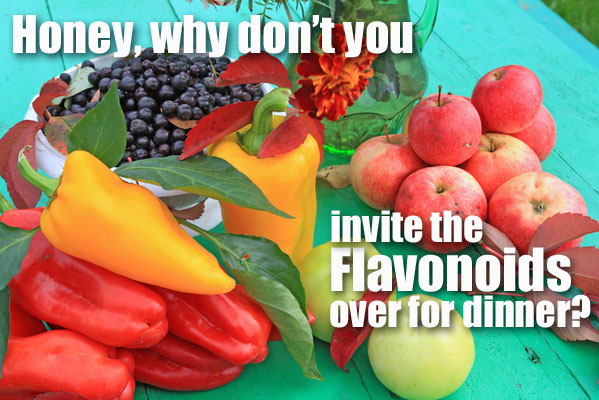
According to the Linus Pauling Institute, flavonoids have several sub-classes. These include flavonols, flavones, flavanones, isoflavones, flavan-3-ols and Anthocyanidins. See the breakdown of antioxidant foods that fall into these categories:
Foods High in Flavonoids:
Flavonols
Onions, scallions, kale, broccoli. Plus apples, berries and teas.
Isoflavones
Soybeans, soy foods, legumes.
Flavones
Parsley, thyme, celery, hot peppers.
Flavanones
Citrus fruit and juices. (For example, oranges, grapefruit and lemons).
Flavan-3-ols
Black, White, Green and Oolong Teas, cocoa-based products, grapes, berries, apples, cocoa-based products, red wine.
Anthocyanidins
Red, blue and purple berries; red and purple grapes; red wine.
Dr Barry Sears, creator of the Zone Diet, talks about flavonoids (a sub-group of polyphenols), and why he ranks them so highly for health. Plus, he discusses how much we need to make a positive impact on our health and how to get them.
By the way, do you like white wine? Dr Sears mentions that you can obtain significant amounts of polyphenols by drinking 110 glasses of white wine per day.
What are the Benefits of Flavonoids?
We’ve all heard that fruits and vegetables are healthy to eat, right? However, it’s not usually explained “Why?”.
Aside from containing a multitude of vitamins, minerals and fiber, fresh produce also contains a high amount of polyphenols, specifically flavonoids. McKenna Parker, RD sums it up well. For example, she says to focus on eating bright-colored vegetables, berries and citrus fruits. Also, the list includes herbs, teas and chocolate (although not so bright).
Not surprisingly, many health experts purport that flavonol-containing tea is a superfood. WebMD states that there is evidence showing that tea reduces heart disease risk. Furthermore, tea may even stave off cancer and Alzheimer’s disease.
In addition, an article in Psychology Today reports that flavonoids contain multiple health benefits. For instance, quercetin benefits include memory improvement, antimicrobial properties, antihistamine effects and mood enhancement.
Also, they list apples at the top of their flavonoid food list. As we know, apples have a high amount of quercetin. The article states that “quercetin shows to reduce cancer risk. Plus, it can prevent heart attacks, stave off cataracts, control asthma, prevent recurrent gout attacks, and speed healing from acid reflux”.
Let’s say you don’t consistently eat lots of quercetin-containing fruits and vegetables. You may want to supplement. However, not all nutritional products are the same. Look for higher-potency supplements that contain Quercetin Dihydrate.
Not sure if you want to add this flavonoid to your diet? Take a look at the possible side effects of Quercetin before you make your decision.
It’s also worth noting that you can now find a quercetin supplement for dogs! These apparently tasty chews provide smaller doses of the flavonoid to help pets minimize allergic reactions, itchy skin and watery eyes.
